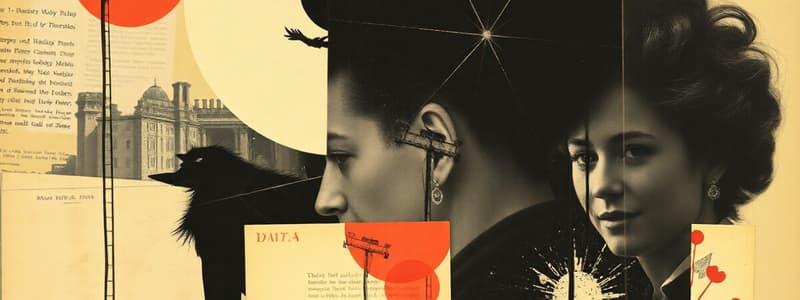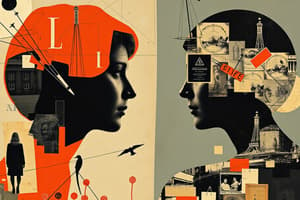Podcast
Questions and Answers
What was a notable artistic movement that influenced early 20th-century cinema, particularly in the context of avant-garde films?
What was a notable artistic movement that influenced early 20th-century cinema, particularly in the context of avant-garde films?
- Romanticism
- Surrealism (correct)
- Constructivism
- Realism
Which filmmaker is closely associated with the concepts of trance films in North American avant-garde cinema of the 40s and 50s?
Which filmmaker is closely associated with the concepts of trance films in North American avant-garde cinema of the 40s and 50s?
- Maya Deren (correct)
- Germaine Dulac
- Man Ray
- Luis Bunuel
What is one of the five elements of montage according to Eisenstein's theory?
What is one of the five elements of montage according to Eisenstein's theory?
- Symbolism
- Juxtaposition (correct)
- Conflict
- Rhythm
Which decade is represented by the works of Joseph Cornell?
Which decade is represented by the works of Joseph Cornell?
The Kuleshov Workshop was instrumental in the development of which cinema theory?
The Kuleshov Workshop was instrumental in the development of which cinema theory?
Who is associated with the movement known as the New American Cinema Group?
Who is associated with the movement known as the New American Cinema Group?
Which artistic movement is characterized by its anti-art sentiments and emerged during the 1910s to mid-1920s?
Which artistic movement is characterized by its anti-art sentiments and emerged during the 1910s to mid-1920s?
The term 'Lyrical Film' is associated with which theorist?
The term 'Lyrical Film' is associated with which theorist?
Which avant-garde filmmaker is known for their work alongside Salvador Dali?
Which avant-garde filmmaker is known for their work alongside Salvador Dali?
Which filmmaker is considered a pioneer of structural films?
Which filmmaker is considered a pioneer of structural films?
The Political Avant-Garde primarily addresses which theme in its works?
The Political Avant-Garde primarily addresses which theme in its works?
What is a characteristic aspect of experimental cinema during the early 20th century?
What is a characteristic aspect of experimental cinema during the early 20th century?
What was a primary focus of French Impressionist cinema?
What was a primary focus of French Impressionist cinema?
Feminist Experimental Practice often seeks to challenge what?
Feminist Experimental Practice often seeks to challenge what?
Which experimental cinema institution focuses on Canadian filmmakers?
Which experimental cinema institution focuses on Canadian filmmakers?
Expanded cinema refers to which of the following?
Expanded cinema refers to which of the following?
Flashcards
Soviet Montage
Soviet Montage
A film editing technique emphasizing the juxtaposition of shots to create meaning and impact.
Eisenstein's Montage Theory
Eisenstein's Montage Theory
Eisenstein's theory posits that the juxtaposition of shots creates a new meaning far exceeding the meanings of the individual shots.
Avant-Garde Cinema
Avant-Garde Cinema
Experimental film production emphasizing innovation and pushing the boundaries of filmmaking techniques.
Montage in Narrative Context
Montage in Narrative Context
Signup and view all the flashcards
Cinema of Attractions
Cinema of Attractions
Signup and view all the flashcards
Kuleshov Effect
Kuleshov Effect
Signup and view all the flashcards
Surrealism in Film
Surrealism in Film
Signup and view all the flashcards
Found Footage Filmmaking
Found Footage Filmmaking
Signup and view all the flashcards
Joseph Cornell
Joseph Cornell
Signup and view all the flashcards
Stan Brakhage
Stan Brakhage
Signup and view all the flashcards
The New American Cinema Group
The New American Cinema Group
Signup and view all the flashcards
Lyrical Film (Sitney)
Lyrical Film (Sitney)
Signup and view all the flashcards
The Structural Film
The Structural Film
Signup and view all the flashcards
Andy Warhol
Andy Warhol
Signup and view all the flashcards
Experimental Animation
Experimental Animation
Signup and view all the flashcards
Expanded Cinema
Expanded Cinema
Signup and view all the flashcards
Study Notes
Experimental Cinema
- Avant-garde cinema movements break from tradition
- Consider emotional and intellectual response to film
- Look for motifs (repeated elements) in film
- Examine film structure (beginnings, endings)
- Consider film materials (e.g., footage, still photos, paintings)
Romanticism in the Arts
- An artistic and intellectual movement in late 18th- and early 19th-century Europe
- Emphasized emotion, intuition, and individualism
- Celebrated the free expression of the individual artist
- Favored nature over industrialization
Modernism in the Arts
- A movement that challenged traditional ideals in response to 19th- and 20th-century societal changes
- Emphasized a belief in human creativity and reshaping the environment through science, knowledge, and technology
Early Cinema & Gunning's “Cinema of Attractions”
- Early cinema was not lacking, rather a different style
- It was meant to draw the audience's attention to the film itself, not to tell a story
- Early films focused on 'attractions', (visuals, spectacle, and special effects)
Post-Revolution Soviet Cinema
- Soviet filmmakers used film to promote political ideologies and suppress conflicting ideas (like international thought)
- Films emphasized narrative, or intellectual responses by their audience, in addition to visual responses
- Russian civil war influenced the approach of their cinema
Soviet Montage & The Kuleshov Workshop
- Editing in Soviet cinema served to create narrative/create ideas
- Montage was seen as a form of creating thoughts/feelings or intellectual reactions from the viewers
- Montage was also seen as a way of connecting shots together to create a powerful effect
Montage Theory - Key Figures
- Sergei Eisenstein explored dialectical montage: conflict between shots creating a greater meaning
- Dziga Vertov emphasized montage as a way to capture the immediacy of the world (also to capture the feeling of real-time)
- V.I. Pudovkin emphasized the connection of shots based on narrative need
Avant-Garde Cinema
- Films that break from established aesthetic conventions (often extreme)
- Emphasis on technique and imagery over narrative
- Often considered as the beginning of the modern film movement
Dadaism
- Artistic and literary movement in which artists rejected traditional artistic and cultural norms, and instead aimed to create chaos, surprise, or shock
- They sought to make anti-war statements and/or portray their rejection of their surroundings in their work
Surrealism
- Art and literary movement in which artists focused on the exploration of dreams and the subconscious mind
- Often used symbolism and unusual imagery in their works
Filmmakers
- René Clair: a french filmmaker known for his surrealist films
- Maya Deren: an American-born filmmaker
- Stan Brakhage: American filmmaker well known for his experimental film techniques and aesthetic choices
- Andy Warhol: An artist and filmmaker known for his pop art style films
- Kenneth Anger: American filmmaker (and also studied surrealism). He is known for his use of dream logic.
- Germaine Dulac: A pioneering French feminist filmmaker
- Joseph Cornell: American visual artist. His work with Assemblage (collage in three dimensions) and the "Cornell Boxes" is well known.
- Su Friedrich: An American feminist filmmaker
- Abigail Child: An American filmmaker known for her feminist ideas and the personal aspect of the film (i.e., autobiographical)
- Leslie Thornton: An American artist who experimented with film by using visual and technical forms.
Animation
- History of techniques and styles, including silhouette animation, pixilation, and multimedia animation
- Key figures and their contributions, such as Norman McLaren, Lotte Reiniger, Oskar Fischinger
- Emphasis on visual experimentation and creation of unique visual styles
The Political Avant-Garde
- How political movements influenced filmmaking, notably including Feminism and Socialist thinking
Canadian Experimental Cinema
- Description of Canadian film institutions and key figures
- Discussions of the Escarpment School and other groups and individuals (e.g., organizations) who promoted avant-garde cinema
Studying That Suits You
Use AI to generate personalized quizzes and flashcards to suit your learning preferences.





